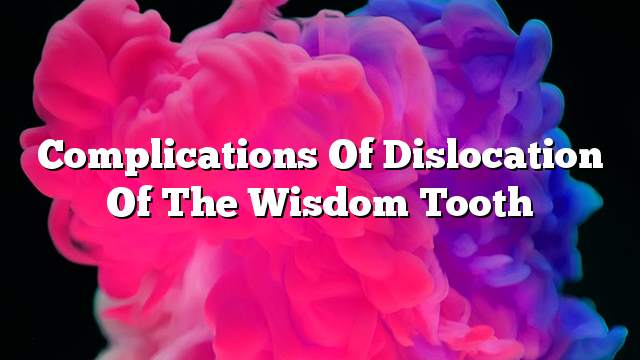Wisdom tooth
Wisdom tooth is the third and last molars of the mills (Mols) and begins to grow in their twenties, and they are useful if they are healthy, healthy, and suitable in the mouth, but they are usually The tilt is either tilted toward the seventh tooth or tilted away from it, or it is perfectly horizontal and may be above or below the rest of the teeth, and then it needs to be removed. The arrangement of the wisdom tooth and placing it in the jaw affects the neighboring teeth; it may cause contention or destruction, as well as affect the bones of the jaw and neighboring nerves. The brain may be partially or partially covered. If it is partially blocked, it is a gateway to the bacteria entering the area surrounding the tooth, causing it to be inflamed, and the partially buried brains of the brain are more likely to decay and gum disease. The process of cleaning and accessing them is difficult.
Complications of dislocation of the wisdom tooth
Usually the removal of the wisdom tooth requires surgical procedures such as gum removal and bone removal. Often, this dislocation is not followed by long-term complications, and the complications that rarely occur include:
- Dry Socket is one of the most common complications that occurs after the dislocation of the wisdom tooth, usually after three to five days of dislocation. Bone exposure occurs after the dislocation of the brain as a result of the loss of the blood clot. Blood clot) from the site of the wound, and osteoarthritis causes pain in the gums and jaw, as well as the patient may suffer from bad smell or taste in the mouth issued from the place of dislocation, and when looking for the place of dislocation, open bone is what appears instead of blood clot, One of the factors that increase the incidence of this inflammation; non-compliance with the instructions Labib after divorce, smoking, and injury prior to this case, and exceeded twenty-five years old, it is worth mentioning that a review of the doctor in such a situation is necessary, and the doctor that the washing place of dislocation or wounds where substance drug is changed from time to time.
- Hemorrhagic bleeding occurs at the site of removal.
- Inflammation of the area of dislocation due to the entry of bacteria or food residue to the place of extraction, signs of inflammation; high temperature, yellow or white discharge from the area of extraction, as well as swelling, and the presence of pain.
- Damage to neighboring teeth, surrounding bone, nerves, or sinuses.
- Trigeminal nerve damage: Signs of numbness, numbness of the tongue, lower lip, chin, gums, teeth, and pain. The damage usually lasts for a few weeks or months. If the damage is severe, The injury of the nerve may be permanent. It is important to note the effect of this damage on the daily life of the casualty. It makes eating and drinking difficult and painful. The doctor should tell the patient about this before the wisdom tooth is removed, but it is rare.
Causes of dislocation of the wisdom tooth
Do not need all the lights of the mind to dislocation, especially if it emerged properly, and usually take off the teeth of the mind is buried when it causes the following problems:
- Feeling pain.
- The food remains collected and the plaque is behind the spit of the mind.
- The emergence of an oceanic bag is usually filled with fluid.
- The decay of partially buried brainsticks.
- Damage to neighboring teeth or bone around the biceps.
- Infection and diseases of the teeth (periodontal diseases).
- Problems with orthodontics used for orthodontics.
After taking off the tooth sprocket
After the process of dislocating the spit of the mind, the patient suffers almost two weeks of many symptoms, including swelling of the mouth and cheek area in the first days after extraction, and helps to reduce the placement of compresses of cold water on the area, and often disappear swelling over time, The stiffness of the jaw, which often lasts for seven or ten days, it is worth mentioning that the pain may be obvious after the dislocation of the tooth, especially if the process is complex, either the feeling of bad taste in the mouth and the presence of numbness in the lip area, tongue and cheek is possible and normal after operations Take off wisdom tooth.
It is worth mentioning some tips that will alleviate the pain and accelerate compliance with healing, including:
- Take painkillers, such as paracetamol and ibuprofen, and there is some evidence that ibuprofen is the best place to take after a toothpaste.
- Keep away from exerting hard work during the first days of dislocation.
- Sleep at night by placing an extra cushion to support the head.
- Trying to maintain the blood clot forming the place of extraction, by moving away from things that would remove them, such as spitting, eating, and eating hot drinks, especially during the first twenty-four hours of dislocation of the wisdom tooth.
- Refrain from smoking and drinking alcohol.
- Chew eating on other teeth while taking care to eat soft foods and drink liquids.
- Use mouthwashes or saline solution for the treatment after 24 hours to remove the wisdom tooth, and keep this for a few days to prevent the occurrence of inflammation and ulcers.
